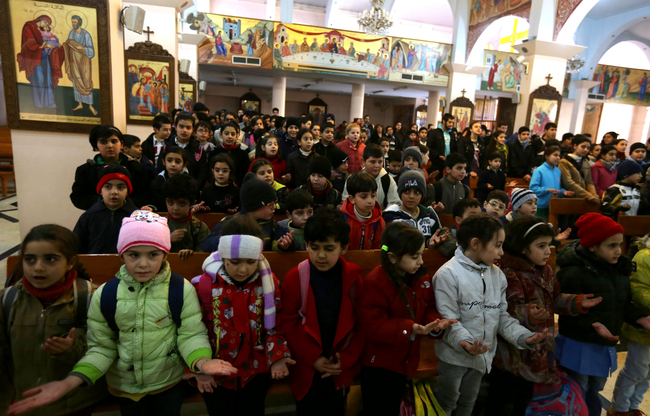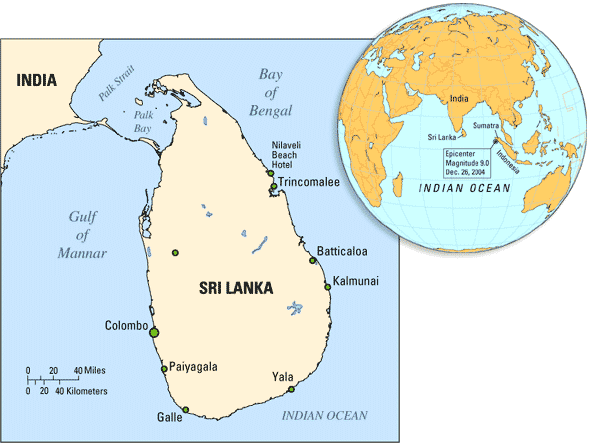Joy and fear for Christians in Sri Lanka
Christmas is a time of joy, but also of fear for Christians in rural areas of Sri Lanka.
Yamini Ravindran, National Christian Evangelical Alliance of Sri Lanka’s (NCEASL) advocacy officer, said, “Christmas is commercialized for the Christians residing in the main city areas; however, for most Christians in the rural or Buddhist-dominant villages it is a completely different scenario. It is an event filled with joy and fear for them. Joy to remember the birth of Christ—fear to conduct services boldly and fear of attacks against churches, pastors, or Christian members.”
Open Doors warned that Sri Lankan Christians may be under increasing persecution as Christmas nears in the mostly Buddhist nation. Citing recent reports from NCEASL, Open Doors said in a Dec. 19 email that “Christians in Sri Lanka are likely to take extra precautions as they hold their Christmas gatherings and celebrations this month.” The NCEASL noted several recent instances of persecution, including the Dec. 5 visit from authorities who told a pastor to “stop all religious worship activities taking place on his premises” in southern Sri Lanka, according to Open Doors.’
Click to read more at World Mag
Egyptian Copts to celebrate Christmas ‘no matter the circumstance’
By Waleed Abu al-Khair in Cairo
Egyptian Copts are eager to celebrate Christmas and New Year’s this year but at the same time acknowledge the need for increased security.
“Christmas celebrations are a necessity that will not be stamped out by any circumstances or events,” said Father Paul Nathir of the Church of St. Anthony in Cairo’s Shubra district.
He told Al-Shorfa, however, that Copts are planning on making this year’s New Year’s and Christmas celebrations low-key affairs.
“Copts have unpleasant memories of previous New Year’s and Christmas Eves,” he said, recalling the killings in Nag Hammadi on Christmas Eve in 2009 and the bombing of the Saints Church in Alexandria on New Year’s Eve last year that left dozens of Christians killed and wounded.
“Many areas have begun forming popular committees to secure the masses held during the holidays in collaboration between young Christians and young Muslim members of political groups and independents,” he said.
Mena Mitri, a senior in Cairo University’s Department of Languages, said celebrating Christmas is “essential and semi-obligatory, no matter the circumstances”.
Mitri said Christmas festivities in Egypt continue from mid-December through mid-January. Coptic Orthodox Christians celebrate the holiday on January 7th while the Catholic community celebrates it on December 25th.
“The Copts begin decorating their Christmas trees one day after fasting is concluded, or two days before Christmas Day. Women bake cakes and biscuits, most of which are distributed to neighbours, both Christians and Muslims, and some hang curtains and lay out rugs,” Mitri said.
“In the middle of the night on Christmas Eve, everyone goes to church to participate in the mass,” Mitri said. “After exchanging holiday greetings, everyone heads home to start preparing for the feast, which usually takes place in the home of a senior family member such as a grandfather or uncle.”
Turkey, fish, meat pie, fatta, fruit cake, and pumpkin pie are some of the most popular foods served on Christmas.
‘Christmas only differs from Muslim holidays in terms of religious rituals’
Fahim Abdel-Salam, who earned a doctorate in social sciences from the University of Cairo, told Al-Shorfa that the Coptic celebration of Christmas falls on the 29th of Kiahk on the Coptic calendar (January 7th) after a 40-day fast.
“Christmas was one of the grand holidays during the Mamluk period,” Abdel-Salam said. “The Sultans celebrated it and distributed gifts and food to the people, and everyone participated in ceremonies held in public places that were decorated with candles, lanterns and fireworks.”
Holiday decorations during that era consisted of tree branches and red flowers, which were supplanted in homes by Christmas trees, synthetic decorations, lights and red flowers, Abdel-Salam said.
“As for holiday customs, Christians congregate in churches for midnight mass where they sing Christmas hymns. The priest reads verses from the Bible and explains the meaning of the holiday, and church bells ring at precisely midnight,” he said. “However, in recent years, political and security incidents began to dominate the speeches, and they are now included in the holiday sermons.”
Abdel-Salam said the Copts’ observance of Christmas only differs from Muslim holidays in terms of religious rituals. “The feasts, exchange of greetings, and family visits are the same for followers of both religions, which illustrates the depth of the historic relationship between the two sides over the centuries,” he said.
Syrian Christians in Egypt pray for peace at Christmas

Many Syrian refugees have mixed emotions about celebrating Christmas when the crisis in their home country is unresolved. Above, displaced Syrian children from the town of Maaloula attend mass at a church in Damascus. [Louai Beshara/AFP]
Sabouh fled the Bab Touma area of Damascus and took refuge in Egypt with his younger brother Moussa. Both families live in one house so they can save money, he told Al-Shorfa.
“Our home is filled with sadness for what is happening in Syria and everyone is constantly preoccupied with following the successive news,” Sabouh said. “But having six children — three of whom are my brother’s and three of whom are mine — brings joy.”
On the insistence of the children, the brothers decided to hang Christmas decorations and put up a Christmas tree, he said.
“I will head to the church with my entire family on Christmas Eve for midnight prayers and pray for the salvation of Syria and Syrians from the daily bloodbath,” Sabouh said.
He said the church invited Christian Syrian families for a Christmas Eve dinner.
“It will be a family atmosphere without music, dancing and celebrations, but rather a family dinner that will include giving presents from Santa Claus to children,” he said.
Sabouh said he will make sure to attend the dinner because he feels a pressing for such an atmosphere that reminds him of Christmas Eve dinners in Syria.
Emile Rizk is also a Syrian refugee in Egypt.
Rizk came from Yabrud in Syria’s Qalamoun region to escape the war and his family is scattered throughout Egypt, Lebanon and Jordan. He lost some relatives to air strikes and bombardment.
“There is an atmosphere of mourning in our house and I could not put up a tree and decorations, but I will join the midnight mass and pray for peace to return to Syria and for mercy for the souls of my family members and Syrians in general who died [in the war],” he told Al-Shorfa.
When Rizk was in Syria he would often dress up as Santa Claus and give presents to both the children and adults in his family.
The entire family would get together in one of their homes and gather around the dinner table on Christmas Eve. Everyone would join in decorating the Christmas tree, which would be cut from the nearby woods amidst an atmosphere of happiness, he told Al-Shorfa.
“This was an intimate family atmosphere that is about home and family and it is difficult to replicate this feeling away from home,” Rizk said.
Importance of Christmas
The Rev. François al-Hani, of the Church of the Virgin Mary in Cairo, who is a Syrian national, said Christians across the Levant celebrate Christmas in much the same way.
“However, Syria stands out in that the Orthodox and Catholic sects are very similar in size, so celebrations start in December and continue until the end of January due to the different calendars of both sects,” he said.
For five years, al-Hani has been moving around among the churches of Jordan, Egypt and Syria and most of the time spending the Christmas season in Syria to visit family and the first parish he worked in, which is located on the outskirts of Damascus.
But this year, he said he is sad he was not able to visit Syria during the Christmas season.
During his visits to the homes of Syrians in Egypt, al-Hani explains the meaning of Christmas and the importance of celebrating it and having hope for a bright new tomorrow with no war, he said.
“The basic concept of Christmas is joy, salvation and celebration with the arrival of the Saviour,” he said.
Many families are not celebrating this year because they are in mourning for the Syrians who are dying every day in Syria or due to financial difficulties, he added.
The church tries to help by giving away dozens of decorated Christmas trees to families as well as giving parents presents they could distribute to their children on Christmas Eve, al-Hani said.
Church youth groups also are organising parties for children, religious meetings and training for midnight mass hymns, he said.
Some parishes organize group dinners on Christmas Eve for Syrians and non-Syrians alike “but the focus is on Syrians this year and our insistence that they join in the Christmas joy”, he said.


